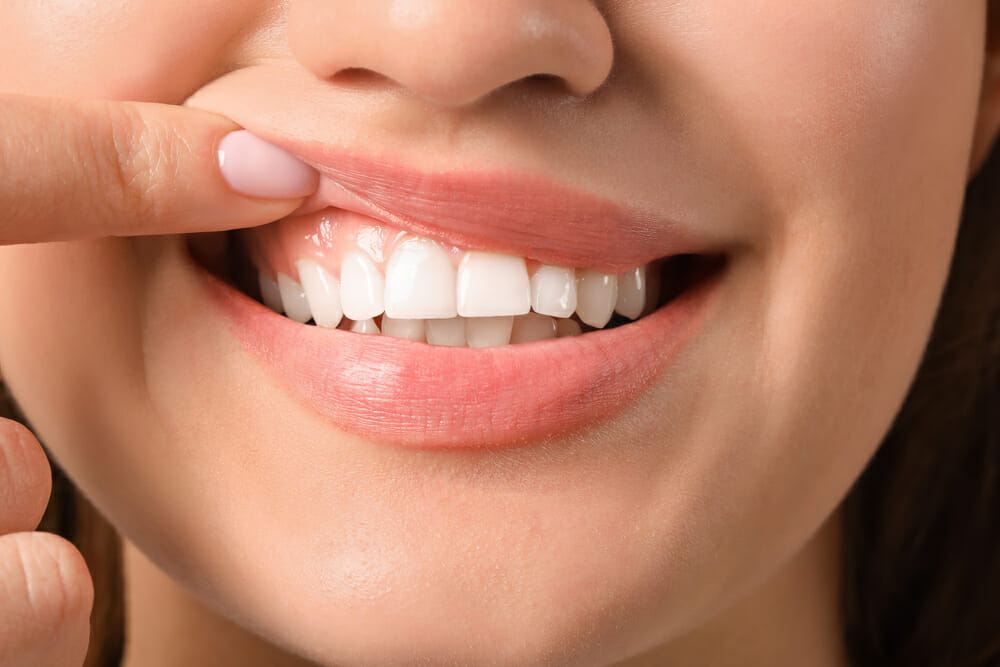When it comes to your oral health and hygiene, a stellar smile goes further than a set of pearly whites. It is so important to take care of your entire mouth, including your gums. Your gums can become inflamed, infected, or diseased (periodontal disease) and this problem may make its way throughout your bloodstream, affecting other areas of your body. In other words, gum care is nothing to take lightly, and there are proactive measures you can take to ward off gum issues before they even have a chance to develop.

Gum care comes up in every general checkup as part of your overall dental health. Whether we discuss a condition you’re currently dealing with or talk in preventive terms, you will be sure to leave here with plenty of knowledge about healthy gum care habits and why they are so essential.
These three healthy habits below will give you the protection you need to keep your gums in great shape. As part of your daily to-dos, be sure to stay on track and never slack off. Your smile can go from dazzling to dangerous if you do not maintain this recommended routine.
Is Brushing Enough to Keep My Gums Healthy?
In a nutshell, no, but brushing at least twice daily is an excellent start. Brushing your teeth is obviously important:
- For removing food particles and debris
- Fighting off tartar and plaque
- Preventing cavities
But there is more to your at-home dental routine than brushing alone, if you want to keep your gums as healthy as you can.
We recommend flossing along with brushing, as your toothbrush simply cannot get into every space, nook, and cranny the way floss can. When you floss your teeth, you can get deep between them, and even beneath the surface where the gums meet the teeth. This process allows you to remove food bits that may have lodged in these areas. If left there, they could breed bacteria, leading to possible infection. Some signs of infection include:
- Red and swollen gums
- Tender or bleeding gums
- Painful gums
- Difficulty chewing or eating
Floss at least once a day, if not more. Get between every tooth, and take your time as you make a conscious effort. Rinse with water once you are done.
If I’m Feeling Fine, Do I Need to Go for a General Checkup?
The purpose of a professional general checkup is to prevent you from having to deal with dental/oral issues that may occur without this twice-yearly examination. Even if you are feeling fine, you may have something starting that you aren’t even aware of. If it is a gum problem, nipping it in the bud before something worse starts brewing will save you from significant pain and pressure down the road.
During your general exam, we will check your gums for telltale signs of gum disease:
- Starts with gingivitis
- Can lead to bleeding and related tooth decay.
We will provide the needed treatment so you can move forward with a healthier smile, free of infection or potentially worse.
On the other hand, if you are not feeling fine, do not wait until your next general exam to see us. A gum problem can become a burden if left to linger for weeks or months on end. Most likely, it won’t go away on its own, so be sure to book an appointment so we can determine what’s going on and how to treat it swiftly and successfully.
Can Mouthwash Help Me Maintain Good Gum Health?
Yes, but the type of mouthwash you use is what matters. This is not about fresh breath alone, so be sure to choose a mouthwash with antibacterial and therapeutic qualities. This sort of mouthwash can effectively:
- Reduce tartar buildup
- Help eliminate plaque
- Wash away food particles that brushing and flossing left behind
Some mouthwashes contain fluoride too, which will further protect your teeth and gums. Swish your mouthwash vigorously post-brushing and flossing, at least once daily, if not every time you brush.
If you are experiencing issues with your gums or if any other oral problems are causing you concern, please contact us at (262) 297- 4265. Our front desk staff will get you in as soon as possible. You can also fill out this online form and someone on our team will contact you to schedule your appointment promptly. We look forward to seeing you at our COVID-safe office. Dentistry Of West Bend is open from Monday through Thursday.


Recent Comments